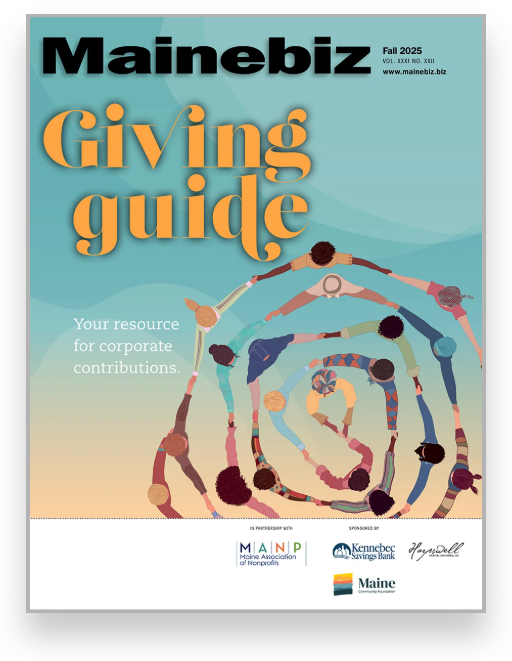Processing Your Payment
Please do not leave this page until complete. This can take a few moments.
- News
-
Editions
View Digital Editions
Biweekly Issues
- October 20, 2025
- October 6, 2025
- September 22, 2025
- September 8, 2025
- August 25, 2025
- August 11, 2025
- + More
Special Editions
- Lists
- Viewpoints
- Our Events
- Calendar
- Biz Marketplace
Acoustic duet | A conversation with Jonathan Cooper, co-owner of Acoustic Artisans in Portland
 Photo/David A. Rodgers
Scott Conley (left) and Jonathan Cooper, co-owners of Acoustic Artisans in Portland
Photo/David A. Rodgers
Scott Conley (left) and Jonathan Cooper, co-owners of Acoustic Artisans in Portland
Founded: June 2008
Employees: 1
Startup costs: $8,500
Projected revenue, year one: $200,000
Projected revenue, year two: $300,000
Contact: 749-1279
1 Forest Ave., Portland
www.acousticartisans.com
What is Acoustic Artisans?
Acoustic Artisans is a collaborative workshop specializing in the building of fine string instruments, primarily instruments of the violin family and acoustic guitars. We also offer classes in instrument making and music lessons and we provide space for people to do some performance, all based on acoustic and string instruments.
Why did you and your business partner, Scott Conley, decide to open this business?
Both Scott and I had been on our independent ends of the business, myself in violin making and Scott in guitar making, and both he and I decided the time was right to move into Portland and have a workshop here in town, given the current state of music and the availability of space. I was in North Gorham and Scott was in Bowdoinham and we both had studios at our homes.
Scott was thinking of opening a guitar school and I suggested we could do some violin making as part of that and we decided to expand on that idea and move our workshops into the same building together. We’re both musicians, we’ve both made our living working as musicians, and our background is the same in that we both build instruments.
How do you control overhead costs and ensure profit margins?
Our business is a very elemental business. Our primary material is wood, and since we can identify the quality of it ourselves, we can find wood that is good that isn’t overpriced. We’ve also learned how to do what we do without a lot of added expense. Most of our work is done by hand, which seems like it would be slow and unprofitable, but that’s the most efficient way to do it — it’s really the only way to produce high-end instruments. We’re not constructing thousands of instruments a year; in my case I’m only making about 15 to 20 instruments and Scott is making a similar number, so, because we can work by hand, we can keep our overhead low.
What are the average costs of the instruments?
A violin I would make would cost $15,000 and Scott’s guitars are in the range of $3,000 to $8,000. Mandolins are about $10,000, and cellos $32,000.
What’s been your biggest accomplishment as a business so far?
I think our biggest accomplishment as a business has been to create a lot of interest in the music scene in this area by having workshops and jam sessions and instrument making. We’ve created a center for music that didn’t exist previously and we’ve provided a focal point for it and that’s something we’re proud of.
How do you market your business?
Primarily, our advertisements are through word of mouth and the web. I have close to 300 violins out there that I’ve made and Scott has quite a few guitars out there, so people see your instrument and ask where it comes from and find us on the web, so our inquiries are direct inquiries. We will go to music festivals and some trade shows and music camps. Having a physical location has helped quite a bit.
How has the economy affected your business and business strategy?
We haven’t felt it as much as I thought we would. I haven’t seen a drop in sales or any cancellations due to the economy. My feeling is that people hold music right next to having a place to live and eat. When times are good people want to play music, and when times are bad people want to play music. The instruments we make are purchases people buy for a lifetime; they will probably be worth more in the future than they are now, so people would rather put their money into something like that than a lot of other things that are more disposable or risky.
What are your goals for the future of your business in five to 10 years?
Our goals are to continue what we’ve been doing all along. We also want to continue our trade. We both come from a very traditional craft and it’s always the goal of people in that kind of work to pass it on as it was passed on to us, and make it better than when we found it.
Interview by Mercedes Grandin
New Ventures profiles young businesses, 6-18 months old. Send your suggestions and contact information to editorial@mainebiz.biz.
Mainebiz web partners

The Giving Guide
The Giving Guide helps nonprofits have the opportunity to showcase and differentiate their organizations so that businesses better understand how they can contribute to a nonprofit’s mission and work.
Learn More
Work for ME
Work for ME is a workforce development tool to help Maine’s employers target Maine’s emerging workforce. Work for ME highlights each industry, its impact on Maine’s economy, the jobs available to entry-level workers, the training and education needed to get a career started.
Learn More
Groundbreaking Maine
Whether you’re a developer, financer, architect, or industry enthusiast, Groundbreaking Maine is crafted to be your go-to source for valuable insights in Maine’s real estate and construction community.
Learn more-
The Giving Guide
The Giving Guide helps nonprofits have the opportunity to showcase and differentiate their organizations so that businesses better understand how they can contribute to a nonprofit’s mission and work.
-
Work for ME
Work for ME is a workforce development tool to help Maine’s employers target Maine’s emerging workforce. Work for ME highlights each industry, its impact on Maine’s economy, the jobs available to entry-level workers, the training and education needed to get a career started.
-
Groundbreaking Maine
Whether you’re a developer, financer, architect, or industry enthusiast, Groundbreaking Maine is crafted to be your go-to source for valuable insights in Maine’s real estate and construction community.
ABOUT
NEW ENGLAND BUSINESS MEDIA SITES
No articles left
Get access now
In order to use this feature, we need some information from you. You can also login or register for a free account.
By clicking submit you are agreeing to our cookie usage and Privacy Policy
Already have an account? Login
Already have an account? Login
Want to create an account? Register
Get access now
In order to use this feature, we need some information from you. You can also login or register for a free account.
By clicking submit you are agreeing to our cookie usage and Privacy Policy
Already have an account? Login
Already have an account? Login
Want to create an account? Register







Comments